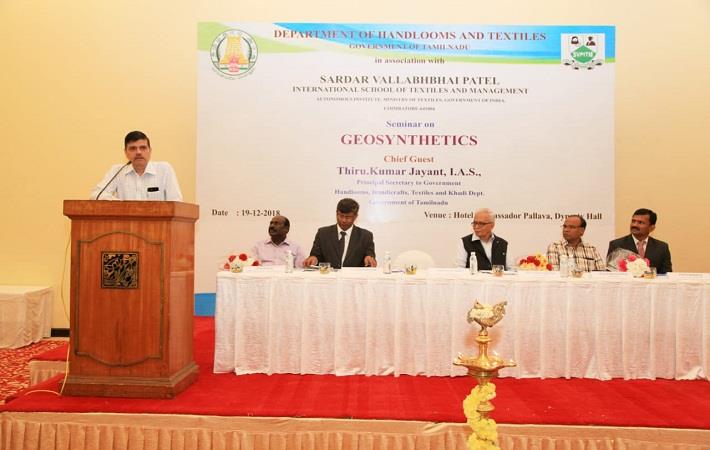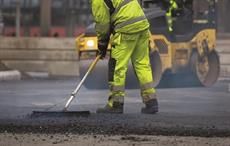
Jayant narrated about the recent developments in the geosynthetic field and invited the entrepreneurs to develop new products in technical textiles, which has a growth rate of 20 per cent per annum. He also spoke about the training provided to the technical textiles entrepreneurs by the department of handlooms & textiles.
The seminar was organised jointly by SVPIT and Tamil Nadu government’s department of handlooms & textiles, in Chennai.
Giving an overview on geosynthetics to the participants, Dr. G Venkatappa Rao, former head- department of civil engineering, IIT, Delhi, discussed on environmental protection and infrastructural development with case studies. He stated that about 400 geosynthetics products are in the market and about 200 of them are utilised in the Indian market. The roles of geosynthetics as separator, reinforcement, drainage, filtration, energy absorber, container and barrier were shown by him with necessary product display. His lecture session included woven and nonwoven geosynthetics, geo-net, geo-strip and geo-grid production process and product development.
A lecture on application of geosynthetics was delivered by M Venkataraman, president, International Geosynthetics Society, Indian Chapter, New Delhi.
Handling a session on geosynthetic products, its applications and advantages, Bombay Textile Research Association (BTRA) scientist VK Patil displayed various geosynthetic products developed by the association. He briefed the participants on the technical characteristics that are necessary for specific applications. Drainage composite for wall protection, geoforms and geotubes, present scenario of road sector and opportunities for the geosynthetics, erosion and flood control with geosynthetics were discussed during the session.
Explaining the application of jute interface with geosynthetics, Dr. Mahuya Ghosh, scientist from Indian Jute Research Industries (IJIRA), Kolkata, gave comparative analysis of root proof jute geotextiles and polypropylene blended geotextiles for road construction with various case studies.
Interesting case studies were presented by M Sudhakar, senior general manager, MaccaFerri Environmental Solutions, on the pavement stabilisation in creek Kalatalav, Sanesh Road, Bhavnagar; muck disposal from Rampur hydroelectric power plant, Shimla; construction of new airport at Pakyong, Sikkim; re-wall on stone column at Adani, Mundra and Trivandrum; and canal lining in Haryana.
A lecture on geosynthetic products – competitive advantages with suitable case studies was delivered by Saurabhh Vyas, head – technical services, TechFab Industries Ltd, Gujarat. He elaborated on the various certifications needed for authorising the products. He also told the participants about the various projects which were taken up by the company. It included 2.6 million square metre (1600MT) nonwovens supplied for geo bags making under Asian Development Bank (ADB) funded project in Assam and the prefabricated vertical drain in Udaipur Agartala.
The final session was a strength weakness opportunity threat analysis (SWOT analysis) on geosynthetics and its market. The participants had an interactive session with the speakers during the session convened by Dr. Rao, M Venkataraman, VK Patil, M Sudhakar, and Saurabhh Vyas.
About 85 participants from rural development and panchayat raj, slum clearance board, highways, public works department town and country planning, Tamil Nadu Water and Drainage Board, Tamil Nadu Housing Board, Chennai Metropolitan Development Authority, Builders Association of India and budding entrepreneurs attended the programme. (PC)
Fibre2Fashion News Desk – India

